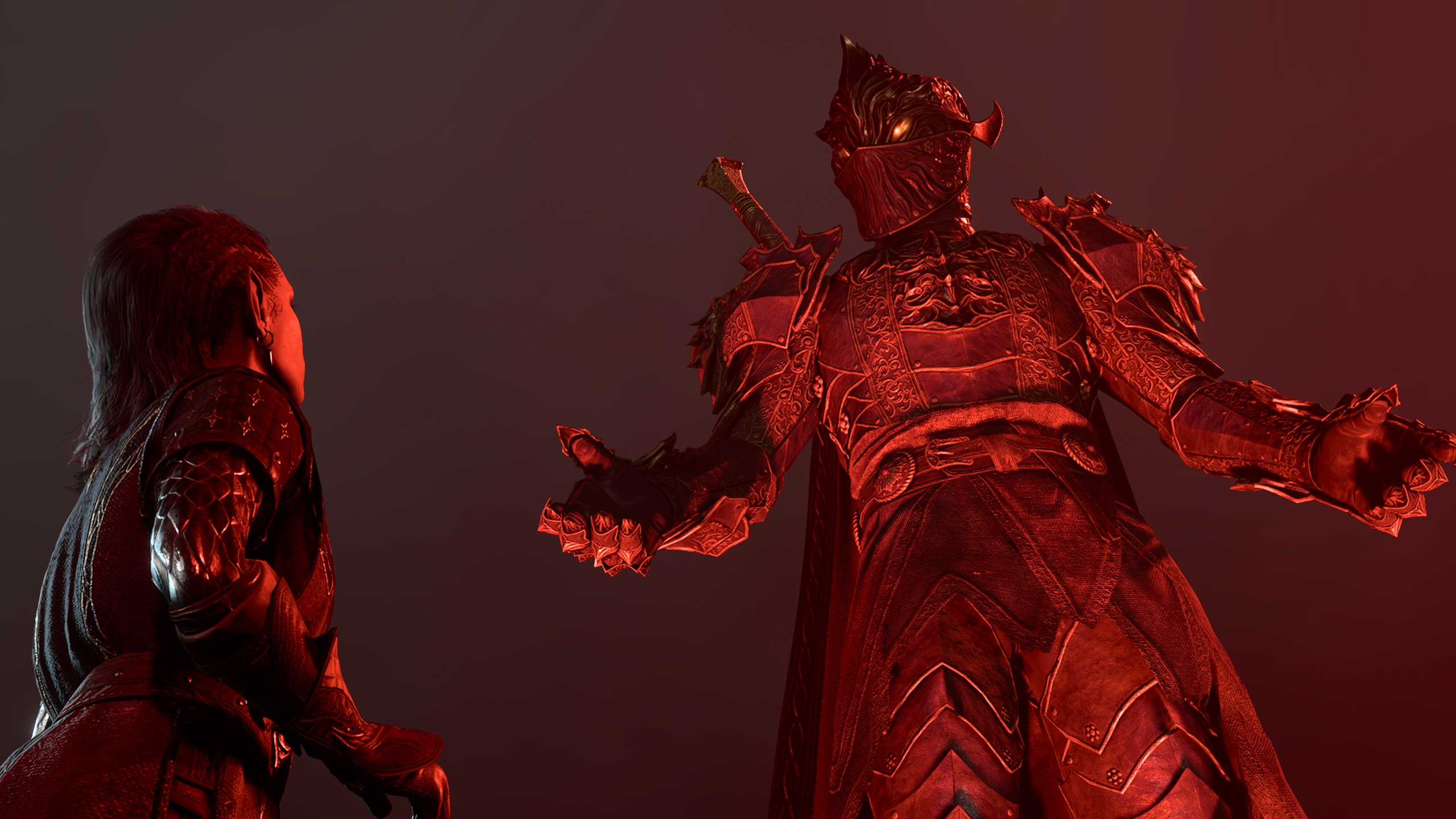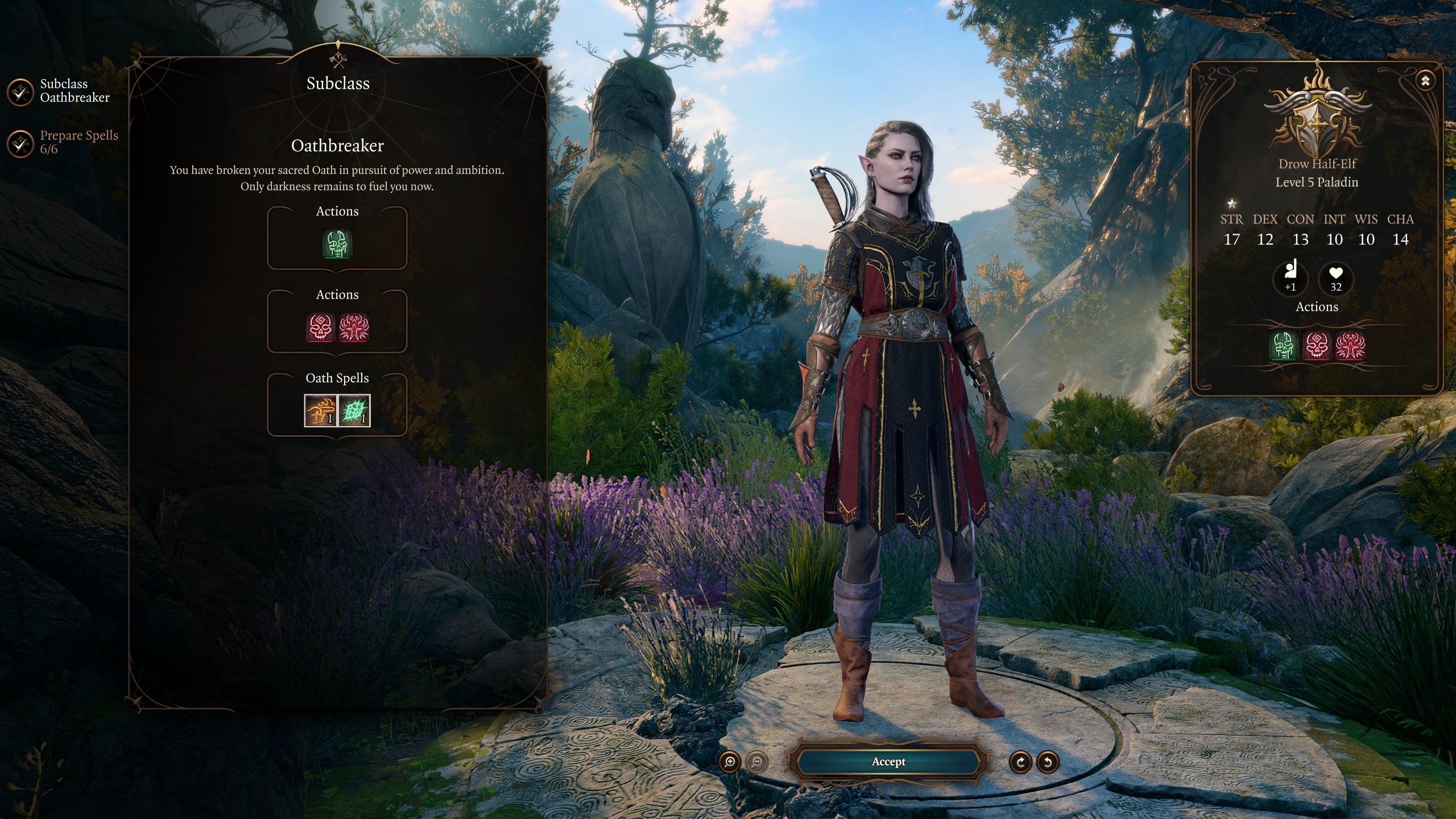
I am a chronic people pleaser in RPGs. No matter how many playthroughs I start I've still gotta be a Good Guy who even my prickliest party members come to trust. So obviously I'm playing a Paladin in Baldur's Gate 3, bound to my morals and my oath (the Oath of Vengeance, because sometimes I like to be 'spicy nice'). Like your tabletop DM, Baldur's Gate 3 expects your Paladin to commit to the role. If you don't, you'll be forced to abandon the subclass you chose in character creation and become an Oathbreaker instead.
The Oathbreaking Paladins are one of the weirdest subclasses in Baldur's Gate 3 that our resident D&D nerds were excited about playing. I can now confirm that yeah, being bad is kinda cool.
How do you actually break your oath?

There are plenty of ways to become an oathbreaker in Baldur's Gate 3; some are big story choices and others can take you a bit by surprise. I broke my oath pretty knowingly, deciding to roll back to a former save state and agree to raid the Emerald Grove for reasons that definitely had nothing to do with spending one night with the evil Drow lady. Since I'd taken the Oath of Vengeance, pledging to give no mercy to the wicked and always fight the greater evil, siding with the goblins was a pretty clear no-no.
My fellow PC Gamer Paladin Tyler Wilde, on the other hand, broke his vow of Devotion (courage, compassion, duty) by accident while trying to free Lae'zel from the tieflings that captured her early in the game. He pretended to be on their side to get her down, and then wound up killing them, which is not honorable at all. He's not the only other PC Gamer editor to get caught out by that encounter, so be wary of the inflexible Devotion oath.
After my unforgivable transgression, I was visited by the Ghost of Paladin's Past (the Oathbreaker Knight) with an ominous vision and was told I'd been put in timeout—suspended from using my oath actions. Later he visited my camp to deliver a very "I'm not mad, just disappointed" style speech. I did get to explain myself, justifying my actions with anything from "actually, following my oath was unconscionable" to "I didn't mean to" to "I was tired of dogma." Interestingly, Karlach approved of the latter, so even my goodie party members definitely see shades of grey. The knight himself of course had quite noble reasons for turning against his own oath, he claims.
What does an Oathbreaker do?

In any event, I had fallen from grace and was forced to accept the consequences: losing my baddie debuffing skills like Vow of Enmity, Bane, and Abjure Enemy in favor of more edgelord choices like Dreadful Aspect and Control Undead.
Here's what my Oathbreaker earned at level 5:
- Spiteful Suffering (Oath Charge Action): Target takes 1d4 Necrotic damage for 3 turns and attack rolls against it have an advantage.
- Control Undead (Oath Charge Action): Controls an undead creature to follow you and attack your enemies until a long rest.
- Dreadful Aspect (Oath Charge Action): Frighten a nearby enemy for 2 turns.
- Hellish Rebuke (Evocation Spell): 2d10 fire damage reaction to an attack.
- Inflict Wounds (Necromancy Spell): 3d10 necrotic damage at melee range.
Breaking my oath meant changing my playstyle to adapt to these different abilities, and a bit of an adjustment to who adventures with me on the regular. My Oathbreaker Paladin now heads to the front lines of a fight a lot faster, rather than hanging back to apply buffs before closing the distance with enemies. And rather than considering myself a substitute for Shadowheart's melee and healing abilities, I've become more analogous to Wyll's melee and offensive spell-slinging.
If you really don't want to become a necrotic, spiteful husk of your former oath, you can pay your way back into your own good graces. An offering of 1,000 gold to the Oathbreaker Knight at your camp will allow you to re-devote yourself to your beliefs.
So far, breaking my oath feels like a wide-open field for roleplaying. I've still got access to all the Paladin-specific dialogue choices that invite me to mediate disputes or advise other characters. I've yet to encounter any Oathbreaker-specific dialogue, but I imagine it's out there.
Without the confines of my oath binding me, I can invent all sorts of Paladin arc headcanons for myself. Maybe I truly am sick of dogma, refusing to ever choose any class dialogue choices in the future and imposing my own fickle will on my party. Maybe I'm full of regret, fighting for the greater good but making myself wait until near the end of my journey to retake my oath. After spending some time as a dirty betrayer, I'm starting to think I may want to roll back to another save file and become an Oathbreaker for good.







